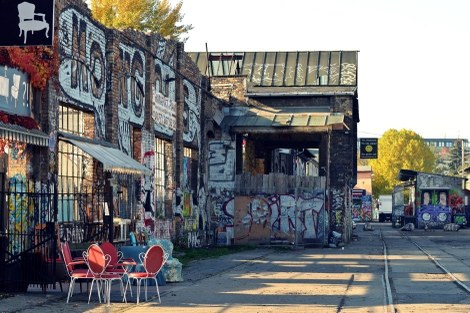Climate Action - OpenHeritage
H2020 SC5 Climate Action
The H2020 Research and Innovation Action “Organizing, Promoting and Enabling Heritage Re-use through Inclusion, Technology, Access, Governance and Empowerment” (OpenHeritage) will focus on the redevelopment of abandoned or underused cultural heritage through community-involvement, and will explore the potential of heritage for creating community cohesion, social integration, innovative bottom-up economic activities, and employment. The project examines possible tools, governance, economic and business models to stimulate the adaptive re-use of heritage in relation to local communities and participatory governance. OpenHeritage consists of a transdisciplinary consortium of scientists, practitioners and agents from sixteen European countries. The project maps and studies sixteen innovative experiments of adaptive re-use in community and stakeholder integration, resource integration, financial management across Europe. Additionally, adaptive re-use laboratories will be set up by the consortium members in six European countries, to experiment with the innovative solutions found. The project is coordinated by Hanna Szemzö (Metropolitan Research Institute, Budapest) and will run from June 2018 until May 2022.

The inclusive governance model recognises that heritage preservation and management efforts are often inefficient and unsustainable without the integrated application of interdisciplinary knowledge, multi-stakeholder cooperation, and community involvement. Thus, the project’s point of departure is the possibility of empowering the community in the redevelopment process of cultural heritage (CH) sites, both locally and on a wider scale, based on the concepts of heritage community and participatory culture. Inclusive governance also means incorporating a coalition of stakeholders into the re-use and maintenance process, the integration of resources, and exploring innovative financial and economic and business models.
The project operates with an open definition of heritage, not limited to listed assets but also involving those buildings, complexes, and spaces that have a symbolic or practical significance for local or trans-local heritage communities. It starts from the assumption that abandoned or underused official and potential cultural heritage (CH) sites not only pose a significant challenge for the public and private sectors, but also represent major opportunities for community cohesion, social integration, innovative bottom-up economic activities, and employment creation.
Objectives
These are the objectives of OpenHeritage
- Create an in-depth evaluation of existing practices of community-based heritage redevelopment
- Promote transferability of practices of community-based heritage redevelopment
- Develop and test an inclusive model of adaptive heritage re-use in CommunityHeritageLabs
- Create a toolbox to support the inclusive adaptive re-use of heritage assets
- Share the OpenHeritage model and toolbox with the wider community of stakeholders and promote its uptake
Role of Ghent University
Ghent University is involved in the creation of the toolbox to support the inclusive adaptive re-use of heritage assets; the evaluation of community involvement & multi-stakeholder governance in several practices of community involvement across Europe; the development of community and multi-stakeholder partnerships in several cases in Europe; and the development of guidelines for public-private-people partnerships.
Contact
Dr. ir. Beitske Boonstra
Department of Mobility and Spatial Planning (AMRP)
Phone number: +32 9 331 3257
E-mail: Beitske.Boonstra@UGent.be